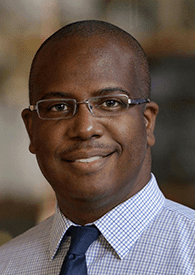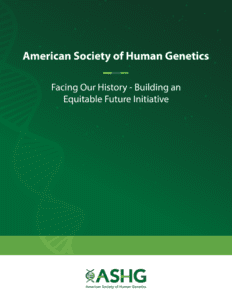
In late January, the American Society of Human Genetics (ASHG) released a report on its Facing our History – Building an Equitable Future initiative. Accompanying the report, the ASHG Board of Directors issued a statement that apologized for “the participation of some of its early leaders in the American eugenics movement, as well as the Society’s failure to consistently acknowledge and oppose harms and injustices tied to the field, including use of human genetics to feed racism, eugenics, and other systemic forms of discrimination.”
The Messenger talked with Neil Hanchard, MD, D. Phil, about the release of the report and what the future holds in terms of immediate actions the Society will take in the months ahead. Dr. Hanchard was the first early-career member of the ASHG Board of Directors and is the current Chair of the Diversity, Equity, and Inclusion Task Force. Additionally, he served as the Expert Panel Facilitator for the initiative.
What brought about this report and statement?
Neil Hanchard: The report and statement came about as a part of ASHG’s diversity, equity, and inclusion agenda, which includes the Facing Our History: Building an Equitable Future initiative. The initiative was launched in December 2021, and was seen as a critical first step in acknowledging and reckoning with a history of past harms fraught with links to racism, eugenics, and other systemic forms of injustice. There was also the sense that it was necessary to put this alongside the steady move toward justice within the human genetics field as well as the Society. The initiative was undertaken by an expert panel composed of human geneticists, historians, clinician-scientists, equity scholars, and social scientists, who reviewed the literature, convened dialogues, and considered insights for action by the Society.
This reckoning has been a long time coming; some would say it’s overdue. The report and statement are important efforts to wrestle with the inequities rooted in the Society’s past, but it is just the starting point – the road ahead requires our continued commitment to strengthening ASHG programs that advance diversity, equity, and inclusion.

What is ASHG’s role in these discussions?
Neil Hanchard: The initiative is a key piece in achieving the long-term goals of the Society, which are embodied by the ASHG strategic vision: that people everywhere realize the benefits of human genetics and genomics research; it’s an ambitious vision, which necessitates that this history be uncovered and made manifest for all, lest it recur. Together with our members, we intend to move the field forward by rejecting discredited notions and past harms that divide our one humanity and embrace a vision of diversity to leverage the profound potential benefits of human genetic research.
How has ASHG evolved and what brought about this evolution?
Neil Hanchard: The larger human genetics community and research discussions have been increasingly engaged and focused on improving diversity, equity, and inclusion in research. This is happening across the field – at NIH, at the National Academies, in scientific journals, in other Societies, and more. Across the breadth of ASHG activities – meetings, journals, advocacy, workforce programs, and professional education we have been helping to lead and support that dialogue. ASHG has also established and enacted rigorous policies and leadership development programs to further support the vision.
What are some of the immediate actions we can anticipate ASHG taking in the months ahead?
Neil Hanchard: As a result of the statement and report, ASHG intends to take several actions in the short and longer term. In the coming months, ASHG will be increasing the integration of equity into its scientific and training initiatives, providing new content in its annual meeting, journals, and professional education programs; and continuing to build the diversity and inclusivity of its leadership. Additionally, approaches will be taken to sustain advocacy for research diversity, equity and inclusion through ASHG’s policy and communications agendas and there will be further prioritization of DEI objectives within the upcoming 2024-2028 strategic plan. We are also suspending the use of individual names for the Society’s professional awards, pending review of any affiliation with eugenics or other harms.
